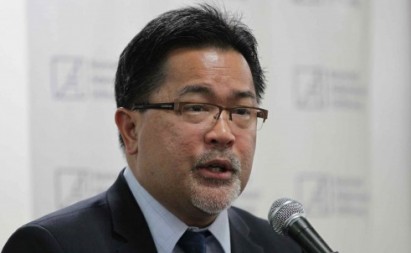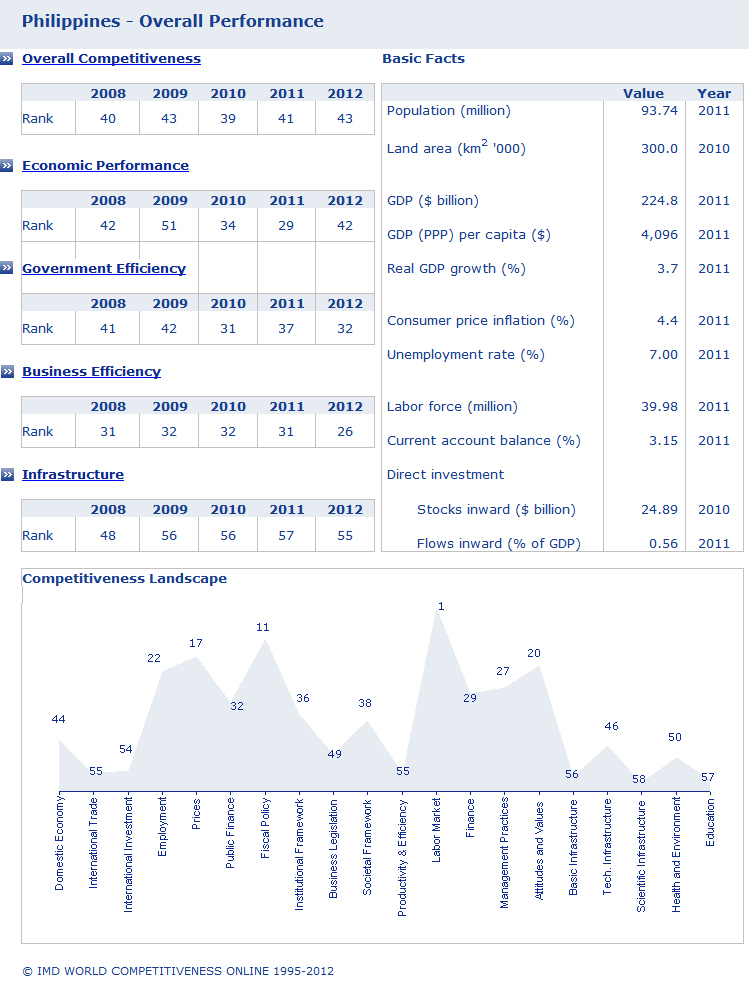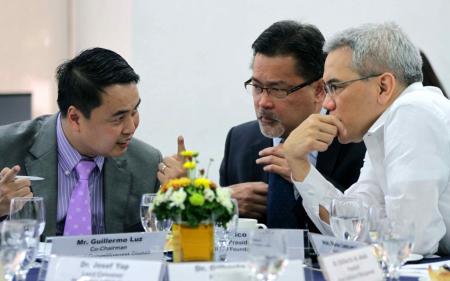- Home
- |
- About Us
- |
- Working Groups
- |
- News
- |
- Rankings
- WEF-Global Competitiveness Report
- Ease of Doing Business Report
- IMD-World Competitiveness Yearbook
- TI-Corruption Perceptions Index
- HF-Economic Freedom Index
- WEF-Global Information Technology Report
- WEF-Travel and Tourism Report
- WIPO-Global Innovation Index
- WB-Logistics Performance Index
- FFP-Fragile States Index
- WEF-Global Enabling Trade Report
- WEF-Global Gender Gap Report
- Gallery
- |
- Downloads
- |
- Contact Us
NCC solution to PH competitiveness riddle: Keep Filipinos from leaving
 |
| Mr. Guillermo M. Luz, Co chairman of the National Competitiveness Council addresses guests and participants of the 2012 State of Philippine Competitiveness Forum at the Asian Institute of Management (AIM). (Photo by interaksyon.com) |
The National Competitiveness Council said the government must entice Filipinos to stay at home to maximize the Philippines’ biggest edge, its labor force, which topped the latest IMD ranking.
Guillermo M. Luz, NCC co-chairman, on Thursday said the government and the private sector must remember that it must look at cooperation only in the context of regional blocks like Asia Pacific Economic Cooperation, Association of Southeast Asian Nations and other free trade agreements the Philippines has signed up on.
NCC is a public-private sector body working on developing a strategy for the long-term competitiveness of the Philippines through policy reforms, project implementation, institution-building and performance monitoring.
"It is a very, very competitive world out there and we must remain focused on this whole idea of competition. Countries, like companies, compete. Countries compete for investments, for jobs, job-creation, trade, and tourists," Luz said during the 2012 State of Philippine Competitiveness Forum at the Asian Institute of Management.
In the case of the Philippines, the NCC realized that the country is competing for its own people as seen in the number of Filipinos leaving to work abroad.
"The fact that so many of our people leave tells us that these people are assessing their future and their ability to get jobs and determine they have better chance of getting jobs outside [of the country]. That's the flipside of the OFW remittance picture," he told the forum.
That said, policy-makers should be "very aware" where the country stands in terms of its core competence, its competitive rankings on various fronts, said Luz.

Download: Highlights of the Philippine Results in the 2012 World Competitiveness Rankings
Luz also said the Philippines must take advantage of the services sector, where the country has a comparative advantage. The private and public sectors should pursue programs on continuous education and training of its workforce.
In addition, policies should be flexible enough as current laws in labor are "quite rigid.”
Some of these are the rules on subcontracting and the high cost of retrenchment. The "retrain-and-redeploy" system is frowned upon by unions.
Other outdated rules like the prohibition on women to work at night have been lifted with the rise of the business process outsourcing industry, with majority of its workers placed on graveyard shifts to service countries in different time zones.
Weak exports hit rankings
Meanwhile, the Philippines has gained traction in terms of government efficiency, mainly on the fiscal policy front. Luz and AIM professor Federico Macaranas have credited the Aquino administration's move to tighten spending and procurement in addressing the problem of keeping budget deficits under control.
Macaranas said the Philippines dropped in the IMD world rankings mainly because of the weakness of the external economy, which dragged the country's exports to negative territory in 2011.
The current sovereign debt woes of Europe, slowdown in China and hobbling US economy is out of the Philippine authorities' control but they must look at how they can balance this weakness in exports with long-term growth, the AIM professor said.
"While data reflects short-term weaknesses in the external economy (international trade), long-term challenges (productivity and efficiency), societal framework are issues that must be addressed by current government reforms," Macaranas said.
One of the solutions is to reduce the cost of doing business to help ease the facilitation of trade and invite investments to the country. The government, he said, is already working on boosting infrastructure through the public-private partnership program in education, transport and agriculture.
On that note, the government must try to explore how it can tap the huge fund that OFWs bring to the country by pooling these and channeling them to infrastructure projects, Macaranas said.
 |
|
Dr. Enrico L. Basilio (left), President of REID Foundation, Inc. stressing a point with Mr. Guillermo M. Luz (center), Co-Chairman, National Competitiveness Council as Hon. Rene K. Limcaoco (right) looks on during the 2012 State of Philippine Competitiveness: Strenghtening Public-Private Partnerships for Infrastructure Development and Regional Connectivity at the Asian Institute of Management. (Photo by interaksyon.com) |

